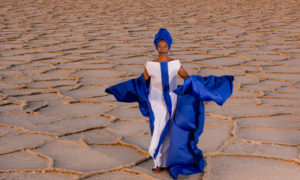African Singer Fatoumata Diawara Believes We Should Expect Respect

One of most vital standard-bearers of modern African music, Fatoumata Diawara has become the star of global music festivals worldwide thanks to the success of her most recent album, Fenfo.
Diawara’s personal mission is to “speak truth to power” when addressing pressing social and humanitarian issues, and she sees herself as carrying on the work started by such powerful world music voices as Miriam Makeba and Angélique Kidjo. She’s collaborated with the likes of Herbie Hancock, Flea, David Crosby, Disclosure and Amadou & Mariam.
In a call from a tour stop in Italy (well before the COVID-19 pandemic struck), she spoke about her illustrious acting and singing career.
Talk about what the tour has been like?
I’m having fun with my audience. At this time, people are a little depressed because of all the information in the world, but after the show, they’re like, “Wow.” I’m happy because this is how I see the music. It’s supposed to make people happy, and it’s working now.
Why do you think your music translates so well around the world?
People talk about my smiling. It’s something totally natural to me. I smile and welcome them. You are you and I am me and we are one. It just says, “I love you guys.”
You grew up on the Ivory Coast?
I grew up in Mali. I was born in Ivory Coast, but I grew up in Mali, which is not bad. The culture of Mali is totally different to the Ivory Coast culture. It’s super diverse and very spiritual. We are still connected to our traditional instruments, and we respect them. I’m very proud of that. That’s what I bring to my show. It’s like when you listen to the sitar, it takes you to some place you have never been. You know it comes from somewhere you don’t know about it. It makes you curious and you want to know more about it.
How did you gravitate to music?
Music is really me. It’s my opinion about the world and what’s going on. It’s about my generation and about my feeling about women. It’s really personal. I love acting because you can transport yourself to be somebody else. You can be crazy and you can smoke and do stuff you don’t normally do in normal life, and I love that.
You started putting out records in 2011. What was the process like?
Before I made my own first record, I had collaborated with people. I was collaborating with a lot of people. I was feeling good, and it was natural and normal [to go into the studio next]. It’s a language to speak in music.
What was it like to perform at Glastonbury in 2013?
It was amazing to be in front of all those people, who were jumping and having fun and being crazy together.
Music is everything. It’s a spiritual language.
Talk about your latest album, Fenfo. What did you want to do differently with this album?
I’m very open with the music. My collaborations weren’t just Mali collaborations. I played with other artists. I played with jazz musicians. I try to bring all those experiences to my music — jazz, folk and reggae. I’m experimenting with all these styles. I just trying to adapt each record and the spirit of the music to nowadays. Music is going this way. It’s something totally natural.
Where did you go to record and what was that experience like?
We did a lot of different studios. I was on tour when I was recording. I really like being on stage. It’s one of my favorite things. So when I had an inspiration, I would say to my manager, “Let’s go now.” We were looking for places before the soundcheck to see where I could go to record. It was like a pregnancy. I would tell him, “Now, now.” When I ask him to go anytime, he knows we have to go.
The song “Nterini” is about the global migrant crisis. Talk about what your perspective is.
It means “My Friend.” It’s about how we can try to respect all these people who are traveling from the boats. I want people to know that you weren’t born a migrant. You become a migrant, and it’s people who make them a migrant. They should not lose their dignity because of this. They deserve something more than this. We drink coffee and we have families who love us. People should know this. The song is about how to respect migrant people. It’s important.
It must be satisfying to deliver the message at this time.
Behind this, there is a lot of love and people can feel that. I want to speak to love and nothing else. Just peace and love.
“Bonya” is one of my favorite tunes on the album.
It’s a pop song. When my manager listened to this, he asked, “Where did you get this? It’s so different. Did you transport yourself?” My songs are so different, and it comes naturally. Music is music. There is no boundary and no nationality. It’s just one family. You respect me and I’ll respect you. The song is about how to respect each other. Let’s stop making each other suffer for nothing.
Talk about your collaboration with Disclosure. How did that come about?
Oh my God. I like them. They are a big friend of mine. They listened to my music and called me to collaborate with them. How could I say no? I love those guys. It was my pleasure.
Photo: Aida Muluneh


